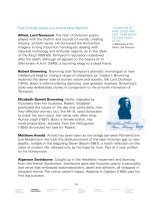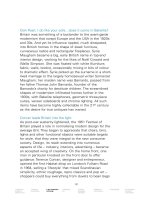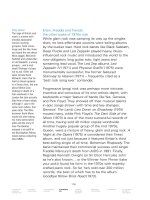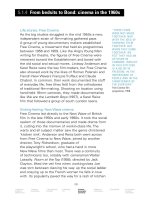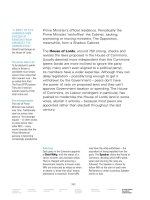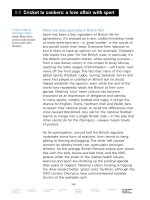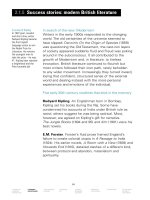Speak the culture britain be fluent in b 188
Bạn đang xem bản rút gọn của tài liệu. Xem và tải ngay bản đầy đủ của tài liệu tại đây (40.85 KB, 1 trang )
Fishy stories
The saga of British rock
music is strewn with
(mostly) apocryphal
stories involving
groupies, hotel rooms,
drugs and the like. Have
you heard the one about
Mick Jagger, Marianne
Faithfull and a Mars Bar;
or Led Zeppelin, a young
groupie…and a mud
shark? Perhaps it’s best
not to ask. Other tall
tales include Keith
Richards’ claim that he
had his blood replaced
in a Swiss clinic, the one
about Mama Cass
choking to death on a
ham sandwich in her
London flat (she actually
died from a heart attack,
although it was in the
same room where, four
years later, The Who
drummer Keith Moon
would die after taking
too many prescription
pills) and the story of
how The Beatles
enjoyed a sly spliff in
the Buckingham Palace
toilets before collecting
their MBEs.
Elton, Freddie and friends:
the other types of 1970s rock
While glam rock was camping its way up the singles
chart, its less effeminate cousins were selling albums
by the bucket load. Hard rock bands like Black Sabbath,
Deep Purple and Led Zeppelin played heavy, bluesinfluenced rock music and introduced the world to the
now obligatory long guitar solo, tight jeans and
screaming lead vocal. The Led Zep albums Led
Zeppelin IV (1971) and Physical Graffiti (1975) were
monumentally successful; the former featured
Stairway to Heaven (1971) – frequently cited as a
‘best rock song ever’ contender.
Progressive (prog) rock was perhaps more intricate,
inventive and conscious of its own artistic depth, with
keyboards a major feature of bands like Yes, Genesis,
and Pink Floyd. They showed off their musical talents
in epic songs strewn with time and key changes.
Genesis’ The Lamb Lies Down on Broadway (1974)
moved many, while Pink Floyd’s The Dark Side of the
Moon (1973) is one of the most successful records of
all time, having sold 40 million copies worldwide.
Another hugely popular group of the mid 1970s,
Queen, were a mixture of heavy, glam and prog rock. A
Night at the Opera (1975) is considered their finest
album, and not just because it featured Britain’s third
best-selling single of all time, Bohemian Rhapsody. The
band maintained their commercial success until singer
Freddie Mercury’s death from AIDS in 1991. Finally,
Reginald Kenneth Dwight (or Sir Elton Hercules John
as he’s also known… or the Winner from Pinner (take
your pick)) found his form in the 1970s with expertly
crafted piano rock. So far, he’s sold over 200 million
records; the best of which has to be the album
Goodbye Yellow Brick Road (1973).
178
1. Identity: the
foundations
of British culture
2. Literature
and philosophy
3. Art, architecture
and design
4. Performing
arts
5. Cinema,
photography
and fashion
6. Media and
communications
7. Food and drink
8. Living culture:
the state of
modern Britain

